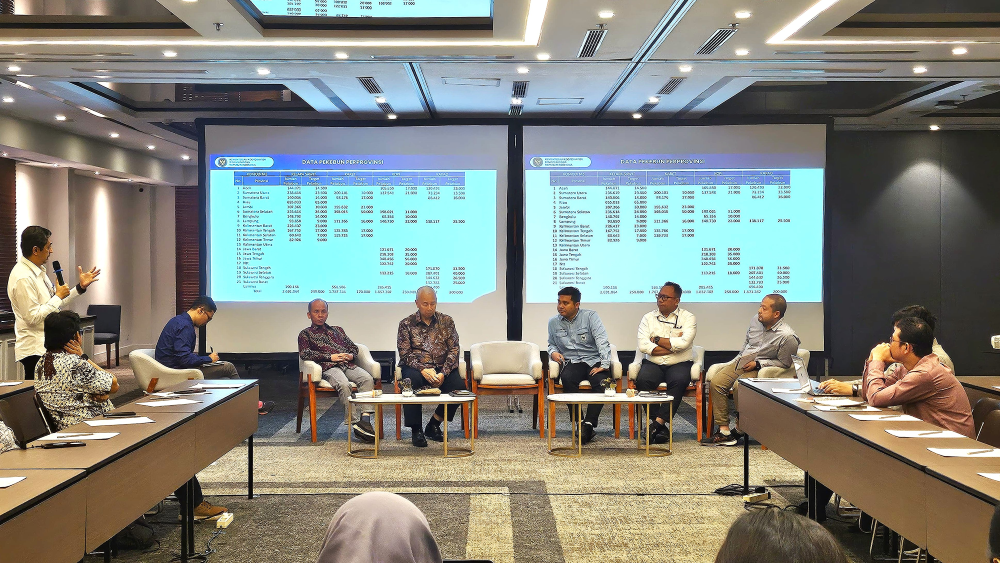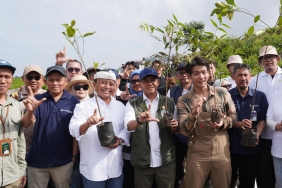WWF-INDONESIA ENCOURAGES DEFORESTATION AND CONVERSION-FREE (DCF) IMPLEMENTATION IN SUSTAINABLE COMMODITY MANAGEMENT
Jakarta, 18 March 2025 - WWF-Indonesia organized a discussion entitled "Implementation of Deforestation and Conversion-Free (DCF) in Jurisdictional Approach for Sustainable Commodity Management in Indonesia". This discussion event aims to encourage parties to implement DCF policies in sustainable and increasingly environmentally friendly commodity management.
DCF is a concept in supply chain management and market governance to ensure raw materials do not come from production units that alter natural ecosystems. This concept has been adopted by export destination countries, distributors, and consumers who implement sustainability policies. That is why, by continuing to maintain environmental conservation efforts, synergy between the government, companies, and development partners is needed so that Indonesian commodities remain highly competitive in the world market competition.
The organization of this discussion event is one of WWF-Indonesia's efforts to facilitate stakeholders to improve their insights and knowledge on sustainable commodity management. Moreover, the local government as the main stakeholder has a very important role. This is in line with the efforts to manage oil palm plantations that are prioritized by the Indonesian government, especially related to legality aspects. The government has established the Forest Estate Control Task Force through Presidential Regulation No. 5 of 2025. This regulation was then followed by the issuance of the Minister of Forestry Decree Number 36 of 2025 regarding the legal subjects of oil palm plantation actors in forest areas, Jangka Benah strategy, and other restoration measures, "explained Irfan Bakhtiar, Director of Climate Market and Transformation, WWF-Indonesia.
Currently, concrete evidence of the success of stakeholder synergy in maintaining commodity competitiveness in line with sustainability policies is seen in the preparation of the Regional Action Plan for Sustainable Palm Oil (RAD-KSB) in Sintang District, West Kalimantan. The Sintang District Government is one of the parties committed to sustainable palm oil management through collaboration between stakeholders and inclusive governance. One of the collaborations between the district government and WWF-Indonesia resulted in Regent Regulation No. 70 of 2023 regarding indicative mapping and management of High Conservation Value (HCV) and High Carbon Stock (HCS) areas in Other Use Areas (APL).
"Balancing between development programs and maintaining important areas is a big challenge for us. That's why integrated HCV and HCS mapping at the landscape scale is so meaningful. This is because it provides a clear framework to identify important areas for conservation. It also guides land use decisions that promote a balance between environmental protection and development needs, especially in land-based enterprises," said Arif Setya Budi, Head of Plantation Development at the Sintang District Agriculture and Plantation Office.
In the plantation sector, WWF-Indonesia supports the development of a sustainable palm oil model through mentoring and training to farmers. Through this initiative, two farmer groups in Sintang District successfully obtained RSPO certification through KUD Harapan Jaya and Koperasi Rimba Harapan. Currently, 458 farmers are organized at the Rimba Harapan Cooperative. They manage 1,033.22 hectares of oil palm land with a production capacity of 19,764 tons of Fresh Fruit Bunches (FFB) per year.
**
For further information, please contact:
Karina Lestiarsi, Communication Officer of WWF-Indonesia
klestiarsi@wwf.id / 0852-1816-1683
About WWF-Indonesia
WWF-Indonesia is a civil society organization with a local legal entity and global network, supported by more than 100,000 supporters. Our mission is to stop the degradation of the earth’s natural environment and to build a future in which humans live in harmony with nature, by conserving the world's biological diversity, ensuring that the use of renewable natural resources is sustainable, and promoting the reduction of pollution and wasteful consumption. For the latest news, visit www.wwf.id and follow us on X (Twitter) @WWF_id | Instagram @wwf_id | Facebook WWF-Indonesia | Youtube WWF-Indonesia





